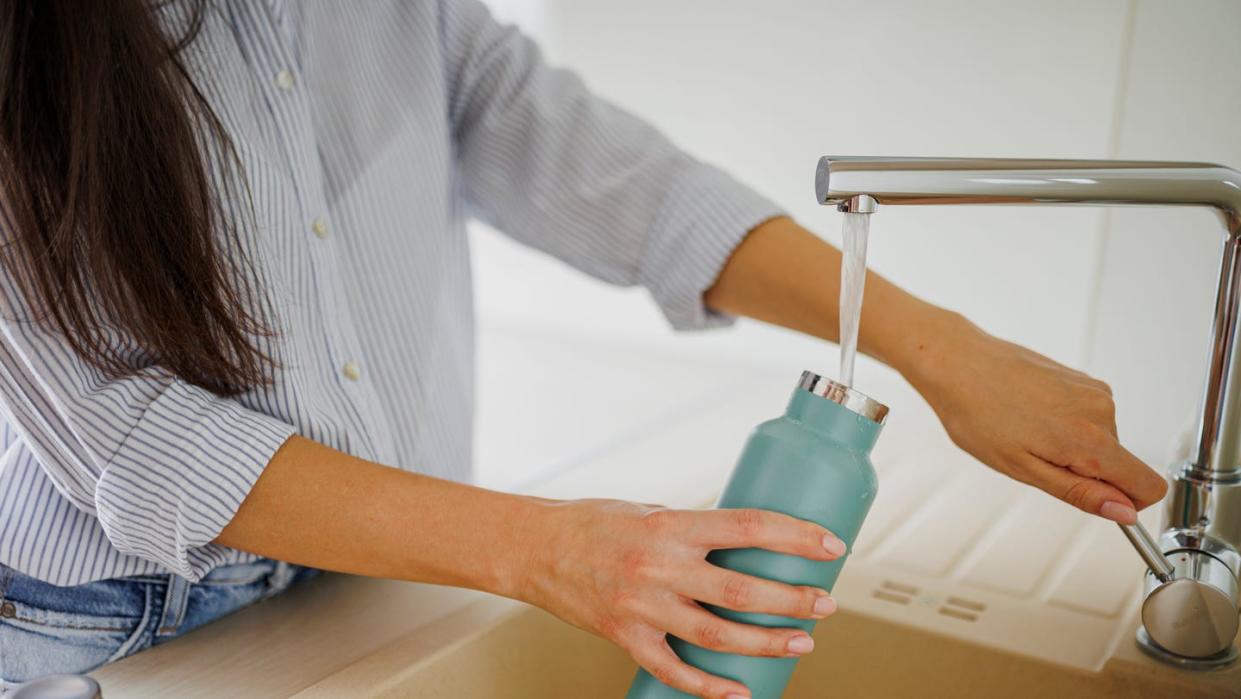Signs That Mean You Should IMMEDIATELY Replace Your Reusable Water Bottles

"Hearst Magazines and Yahoo may earn commission or revenue on some items through these links."
You might purchase a reusable water bottle for a variety of reasons, such as for hydrating at the gym or to reduce single-use plastic. But you might not realize that there can be a shelf life for your trusty reusable water bottle, or any multi-use cup.
"This might seem obvious, but reusable water bottles don't last forever," said Janilyn Hutchings, Certified Professional in Food Safety at StateFoodSafety. "Over time, water, and especially more acidic drinks like lemonade, slowly breaks down the material your bottle is made of."
This challenges the structural integrity of the bottle and, she adds, can cause chemicals to leach into the water.
Aside from the wear and tear from beverages, the inside of a water bottle is an optimal breeding ground for bacteria growth. In order for microorganisms to grow, there needs to be moisture and nutrients present, according to Dr. Alexis Hamilton, assistant professor, Department of Food Science and Technology at Virginia Tech.
In recent years, Dr. Hamilton has seen more use of electrolyte drink mixes being used in water. These can have sugar or other nutrients that support the growth microorganisms like mold, she added.
The best way to avoid this growth is to clean your water bottle regularly and correctly. For cleaning tips, check out our TikTok video and guide for how to clean your water bottle.
Dr. Hamilton recommends following the manufacturer's instructions that come with the water bottle for proper care instructions. These aren't just recommendations, she said, but are specific to the material of the bottle.
"If you are cleaning or sanitizing your water bottle using methods that are not approved for that material or water bottle that you're working with, that means that you can accidentally be doing damage to the structural integrity of that bottle," said Dr. Hamilton.
While many of the damage might be aesthetic, Hamilton said some damage can be at the microscopic level, making it easier for microorganisms to get stuck and make us sick.
If microorganisms are building up in water bottles, a biofilm can form. This is similar to the buildup in pets' water dishes or on your teeth overnight.
"Typically, in order for a biofilm to develop, those organisms have to be in the bottle, and they've got to sit in there with enough water, enough nutrients, all of those things for a good period of time," said Dr. Hamilton. The organisms get encased in a substance that traps them and protects against some cleaners, she added.
Like brushing you teeth in the morning, you have to disrupt the biofilm in your water bottle in order to clean it. "It will often require you to get in there with sometimes a heavy duty cleaner, and actually scrub away at each of those crevices in the bottle and then follow that by some rinses, and then perhaps an antimicrobial rinse of some kind that is approved and safe for use with your water bottle," said Dr. Hamilton.
What's The Best Material For A Reusable Water Bottle?
Ultimately, Hamilton said it comes down to the consumer and how they intend to use it. The clear aspect of glass bottles allow you to visually see if there's anything lingering in the bottle, but they're also more susceptible to breakage. These might be more ideal for using at the office or at home. Stainless steel products are more durable for outdoor activities or tossing in your bag, but it can be more difficult to see inside them.
So How Long Do Reusable Water Bottles Last?
The short answer: it depends. Hutchings cites food safety expert Trevor Craig of Microbac Laboratories for a general rule of thumb when it comes to replacing water bottles. In a Well+Good story, he said that the lifespan of hard plastic reusable water bottles to be about one year and that of stainless steel to be be three years. But it also varies based on how well you clean and maintain your water bottle.
Signs It's Time To Toss Your Water Bottle
There's no hard and fast expiration date when it comes to your reusable water bottle. But according to Hutchings, it's probably time to replace it if you notice any of the following signs:
You see cracks, dents, or scratches, especially on the inside or near the seal or lid
There's an unusual smell or taste to your water
There's discoloration, especially on the inside, seal, or lid
Another sign to look out for, according to Dr. Hamilton, is a lid that won't close.
You Might Also Like
